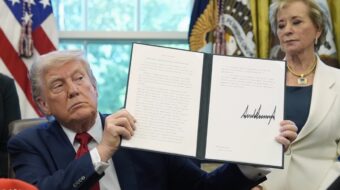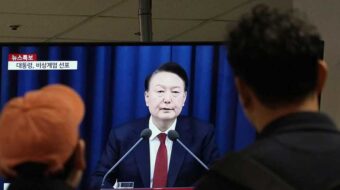NewsAnalysis
After a resounding re-election victory on Dec. 3, in which leftist Venezuelan President Hugo Chavez Frias defeated his right-wing opponent by 63 percent to 37 percent, Chavez has called for the consolidation of all political forces on the left into a “unitary party” to work for a transition to socialism.
Chavez stressed the need for a coherent, united and focused approach to the difficult tasks that the socialist project entails, and emphasized that the organizational form needed for this is a unitary party for socialism.
He is not talking about converting Venezuela into a one-party state or repressing opposition parties, but of persuading the parties of the left that have supported him to merge for greater effectiveness against the still powerful and U.S-backed right, which dominates the mass media and many sectors of the economy.
The Communist Party of Venezuela (PCV) has fully supported Chavez. Its assessment of Chavez is that his stated commitment to socialism is genuine and that the mass “Bolivarian” movement he heads can achieve it.
On Dec. 3, the PCV was the fourth largest vote-getter among the many parties on whose ticket Chavez ran, receiving about 3 percent of the “chavista” vote, increasing its vote total fourfold over six years ago. But Chavez’s own Fifth Republic Movement got 42 percent of the chavista vote, and two other pro-Chavez parties got 6.5 percent and 5 percent. While vote tallies are an imperfect measure of a party’s strength, and while the PCV’s political and organizational capabilities are formidable, it is possible that in a merger its forces would be outnumbered.
The leadership of the PCV has, while endorsing the general idea of a unitary party, called for intensive internal discussion of the specifics.
For communist parties everywhere, the question of merging organically with other forces of the left is difficult. Lenin, the leader of Russia’s Bolshevik Revolution in 1917, argued that to achieve socialism a party of a “new type” was needed, one that was much more disciplined and focused on the socialist goal than was the case with most socialist parties of that era.
Since that time, while communist parties have generally had no problem forming alliances with other parties of the left and even center, the idea of dissolving their own structure and actually merging with such groups has been another matter entirely. There is always a fear that genuine fighters for socialism will be swamped in such a merger by people who do not share the goal of socialism or who conceptualize it very differently.
Thus, while Chavez wants a unitary party so the left can work in a more focused way toward socialism, the experience of communist parties elsewhere has been that merging with too broad a set of forces could have the opposite effect.
For example, in 1981 the Mexican Communist Party (PCM) merged with other parties to form the Unified Socialist Party of Mexico (PSUM), which in turn merged with yet other parties to form the Mexican Socialist Party (PMS) in 1987. Finally, in 1989, the PMS merged with other, mostly centrist forces to form the Revolutionary Democratic Party (PRD).
Many in Mexico feel that what happened to the PCM was more self-liquidation than creative merger, since socialism is not a prominent goal of the frankly social-democratic, reform-oriented PRD. Other parties have now emerged which claim to be the true heirs to the communist tradition.
Writing in Tribuna Popular, a publication of the Venezuelan Communist Party, Jesus German Faria recognizes that such a merger will very likely run into the problem of internal ideological sub-tendencies, especially at the earlier stages. Nevertheless, he writes, democratic centralism should be the organizational principle of the unitary party.
Further, Faria writes: “Will it be a party of cadres or of masses? This party should consist of the best revolutionary cadres … the most ideologically clear, the most honest and the most selfless, who meet the highest standards of revolutionary consciousness, discipline and ethics … it does not have to have big numbers to accomplish its mission. Better fewer but better.”
The author goes on to state that he sees this idea of a unitary party as a way of purging chavismo of corrupt and careerist elements, who would not be allowed in the new party.
Time will tell whether this markedly traditional Marxist-Leninist stance toward party organization wins out both within the Venezuelan CP and especially among the larger non-communist formations that contributed to the Dec. 3 victory.









